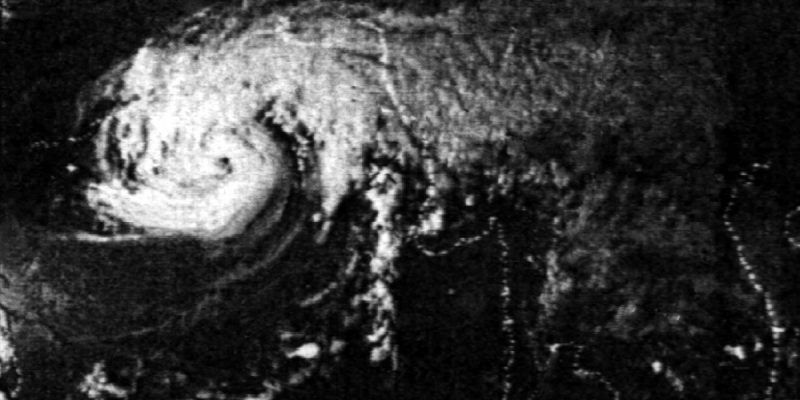Hook si dil mein uthi raat ke sannate mein
Aur phir dard ki lehron mein kaheen doob gai
Aasmaan jis pe fida tha voh zameen dob gayi
(‘A sort of pain rose in the silence of the night
And then it sunk somewhere within the waves of pain
The earth to which the sky was devoted sank, never to rise again’)
– From Sailaab Ke Baad (‘After the Deluge’) by Ghulam Muhammad Qasir
The 1970 Bhola cyclone was a devastating tropical cyclone that struck then-East Pakistan and present-day Bangladesh, along with India’s West Bengal on November 11, 1970, 50 years ago today.
It remains the deadliest tropical cyclone and natural disasters ever recorded. At least 5,00,000 people lost their lives, primarily due to the storm surge that flooded much of the low-lying islands of the Ganges delta. This was the sixth cyclonic storm of the 1970 North Indian Ocean cyclone season, and also the season’s strongest.
The cyclone formed over the central Bay of Bengal on November 8, and traveled northward, intensifying as it did. It reached its peak with winds of 185 km per hour on November 10, and made landfall on the coast of what is now Bangladesh on the following afternoon.
Many offshore islands were devastated. Villages were wiped out and crops were destroyed. In the most severely affected upazila, Tazumuddin, over 45% of the population of 1,67,000 died.
The Pakistani government, led by junta leader General Yahya Khan, was criticised for its delayed handling of the relief operations following the storm, both by local political leaders in East Pakistan and international media. During the election that took place a month later, the opposition Awami League gained a landslide victory in the province, and continuing unrest between East Pakistan and the central Pakistan government triggered the Bangladesh Liberation War, which led to widespread atrocities and eventually concluded with the creation of the country of Bangladesh.
The extent of the cyclone’s destruction was unparalleled. The slums of Noakhali lay desolate for miles, corpses lay scattered unburied and uncovered everywhere. Those who survived this tragedy were worse than dead, many died of starvation.
Humans and natural calamities
The history of human struggle against natural calamities goes back a long time. Yet progress of science and technology has made the impossible possible, the mysteries of seven skies have been revealed and we are more prepared to deal with natural calamities than ever before. Thus the question as to what the government had done to protect vulnerable coastal areas of East Pakistan was a legitimate one.

The 1970 Bhola cyclone track. Photo: Wikimedia Commons.
Pakistan Press International (PPI) had reported at that time that due to the sudden termination of the traditional method of announcement of danger by the Meteorological Department via Radio Pakistan the people of coastal areas and coastal islands had no idea of the severity of the danger.
The leader of the National Awami Party Maulana Abdul Hamid Bhashani had said this alone was indication enough that the government did not take necessary measures to save people from the cyclone.
Whatever hope people had that Pakistan would wake up to the damage done and attempt to rectify it were quashed when it turned out that the powers that be were happy to limit its efforts to just relief activities. Was the objective merely to number the corpses, and not to save human lives, was the question on the ground.
Also read: From East to West, Cyclones at Indian Coasts Remind Us to Put Climate First
It was not impossible to benefit from the measures for prevention of these calamities which had been adopted in other countries, especially in China, given that the country had always been a friendly neighbour.
General Yahya Khan gave the nation the news in a press conference that the central government had approved an expanded plan for long-term construction of the areas affected by the cyclone and for permanent settlement of their inhabitants. Rs 86 crore would be spent on this project, he said. He also revealed that the project had been presented before the World Bank, which had made a definite promise of aid. General Khan also said that he was very seriously thinking over why he should not hand over this project to the army which “would accomplish this task with honesty and diligence.”

General Yahya Khan with American President Richard Nixon. Photo: By Oliver F. Atkins, Public Domain
On accusations of negligence, General Khan said, “I accept the objections. People have a right to object.” But he also said that it was wrong to take “political benefit” out of this tragedy.
Secrets
The details of the project for reconstruction of the affected areas were kept a secret. Government officials handled it and there was no intervention by representatives from East Pakistan or those from the affected areas in the preparation of this plan.
As for the competence and dutifulness of these government officials, the President himself did not appear to be satisfied with it otherwise he would not have said that he was seriously thinking about handing this work over to the army.
Was it not possible to consult political leaders, social workers, medics, engineers and teachers of East Pakistan? These people were much more informed of the local conditions than government officials. Perhaps the expenses could have been reduced as well.
Also read: The Story of Henry Piddington, the Man Who Coined the Word ‘Cyclone’
As far as handing over this work to the army was concerned, no patriotic Pakistani could have denied that the Pakistani army had accomplished great things in the past but it was also true that the reconstruction and settlement of the affected areas was such a huge task that one group alone could not complete it. For this, the practical cooperation of the whole nation was needed.
If memory serves correctly, there also used to be a Flood Commission in Pakistan in those days. The members of this Commission had also visited China and many other countries, where these calamities had been overcome. Their reports too must have reached the eyes of the authorities. Now it is absurd to ask why those reports were not acted upon at that time but if they contained a few recommendations for public cooperation, it would have been suitable to reflect upon them. After all, it was with public cooperation that China was able to redirect its errant rivers and tackle floods.

A 1931 flood in China’s Hankow.
The gulf of suspicion and mistrust between the bureaucracy and the people their action affected became wider with time. Neither was any project successful or satisfactory and nor could it hope to be, without the cooperation of the people.
President Yahya Khan used to say in those days that he was not hungry for political power but wanted to transfer the law and order of the country to representatives chosen by people. In this situation, it was indeed necessary to consult the authentic representatives of the people most affected.
At that time many people – and not just the leftists – had proposed that an empowered joint committee of political leaders, social workers, engineers, teachers, doctors, students, journalists and labour and peasant leaders of various schools of thought be made.
This committee would also include representatives of the army and government. Had the government wanted this project to be successful, it would have composed such a joint committee at the national level. Instead what resulted was a garbled attempt at relief and rehabilitation, mired by corruption.
It is also hard to disagree with what the President had said then, on the fact that the destructions in East Pakistan should not be used as “political football.” But in this respect one is forced to reflect in hindsight upon the news of little-known activities of a few foreign powers. These were published in the newspapers of those days and created great apprehension.
In addition to the engagements of the then US ambassador to Pakistan, political leaders of East Pakistan also objected to the presence of British forces. The Dhaka newspaper Azad revealed at the time that the American government was ready to give aid for the control of floods and cyclones and other development projects but was desirous of establishing a naval base at Chittagong in lieu of it.
The feeling in Pakistan at that time regarding US imperialism was that every single particle of the land of Pakistan was sacred and that Pakistani people would starve but they would not sell their freedom and security to America at any price.
However all of this came to naught as the Awami League, headed by Sheikh Mujibur Rahman, swept up a landslide victory in the national elections on December 7, 1970, largely in part due to the dissatisfaction over relief efforts by the national government. The elections for nine national assembly and eighteen provincial assembly seats had had to be postponed until January 18, 1971 as a result of the storm.
The government’s handling of the relief efforts helped exacerbate the bitterness felt in then-East Pakistan, swelling the resistance movement there. Funds trickled very slowly and transport was slow in bringing supplies to devastated regions. As tensions increased, by March 1971, foreign personnel evacuated because of fears of violence.
The situation developed into the Bangladesh Liberation War, widened into the Indo-Pakistani War of 1971 in December and concluded with the creation of Bangladesh. A natural event had helped to trigger a civil war.
Meanwhile it was left to Ghulam Muhammad Qasir, the 29-year-old Pashtun Urdu poet from a sleepy backwater of Dera Ismail Khan to pen a dirge for the hapless victims of Noah’s Flood.
Maut voh Nooh ka toofaan hai ke jis ke aage
Zeest kohsaar ki choti ke sivaa kuch bhi nahi
Khamushi goonje toa phir saut-o-sadaa kuch bhi nahi
Zeest ki jins-e-garaan maut ki tehveel mein hai
Lashkar-e-umar-e-ravaan rahguzar-e-Neel mein hai
(‘Death is that Noah’s flood before which
Life is nothing but a mountain peak
If silence echoes, nothing are the sound and the shriek
The costly article of life is in death’s custody
Within the Nile’s pathway lies the passing life’s army’)
Note: All the translations from the Urdu are by the writer.
Raza Naeem is a Pakistani social scientist, book critic and award-winning translator and dramatic reader, currently based in Lahore, where he is also the president of the Progressive Writers Association. He can be reached at razanaeem@hotmail.com.




